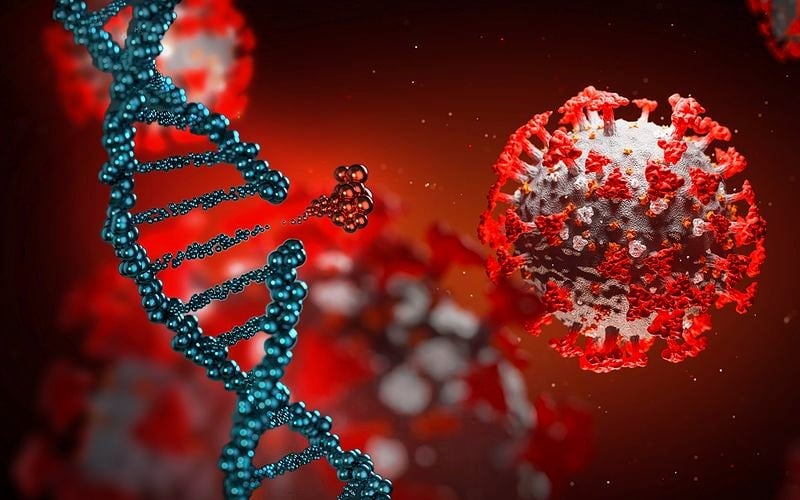The Addictive Gene: Why Addiction Runs in Families
What do scientists mean when they say genetics play a role in addiction? What exactly makes someone more susceptible to addiction? And how does this relate to behavioral and environmental factors? Genetic factors play a significant role in whether someone becomes addicted to drugs or alcohol.
Genetics 101
“I’m an alcoholic because my mother was an alcoholic.”
“My dad is an addict, so I guess I am too.”
These are just two examples of how some people in recovery talk about addiction as a condition they inherited from their biological parents. But is this true? Is addiction in your genes? And if so, what does it mean for you and your family?
To answer these questions, you need to understand genetics.
Genes are the segments of DNA that code for specific traits. Genes are made up of base pairs that can be arranged in different combinations. The other arrangements of base pairs determine how a gene will express itself, which means that one person can have different versions of a gene than another person. These differences are called alleles.
Genetic variation — the fact that we all have slightly different versions of many genes — allows evolution. Genetic variation also means that people may respond differently to environmental stressors like alcohol and drugs. For example, some people may never develop an addiction problem no matter how much substance use they engage in, while others may develop a SUD from their use of substances.
Genes Influence Drug Addiction and Alcoholism
Today, scientists recognize that 40-60% of the risk for drug use disorders stems from genetic sources. As a whole, the research suggests that a common genetic variation may predispose some people to addiction. Specific genes, such as DRD2 and ANKK1, act as “risk genes” for addiction. While it is clear that both genes are associated with the likelihood of developing an addiction, how each gene contributes to this likelihood is much more complex.
- When the researchers blocked dopamine D2 receptors (DRD2s), they found that mice no longer preferred to spend time in an environment where they had previously received cocaine injections. DRD2 is involved in how drugs like cocaine interact with your brain’s reward system. The findings suggest that treating people with cocaine addictions may be possible using existing antipsychotic medications that target DRD2s.
- ANKK1 appears to influence how hard-wired responses develop to drug stimuli and drug withdrawal itself. If you have one copy of ANKK1, your brain will be more likely than others to develop drug reactions. Yet, only those who have inherited two copies seem especially vulnerable to developing addictions in response to these stimuli.
Researchers Use Family Histories
Some researchers use family histories to search for genetic traits that leave people susceptible to addiction. They investigate by dividing a family into two groups: affected and unaffected. When researchers compare DNA sequences, they look for genes involved in addiction. To be considered affected, a person must satisfy specific criteria. Then the researchers compare the DNA sequences between the two groups and identify which genes are different or missing in the affected group.
When studying addiction and its effects, it’s important to note what characteristics are present in a group not affected by the addiction. If a characteristic is found only in the affected group, it may be involved in the susceptibility of that group. Conversely, traits found only in the unaffected group may protect against that addiction.
The problem is that addiction is incredibly complex and influenced by many factors – genes are just one of them. Unfortunately, this can lead to significant misconceptions about alcoholism and other addictions.
Environmental and Other Contributing Factors
People usually think that addiction runs in families because of genetics, but upbringing also plays a role. For example, individuals with parents who abuse drugs or alcohol may be at risk for addiction because their parents introduce them to alcohol or drugs at an early age. They also can be more likely to model their behavior on what they see in their parents and learn that substance use is a way to cope with stress. Environmental factors play an important role in addiction, and this is often necessary for someone with a genetic predisposition to become addicted.
Seeking Treatment
Many treatment programs focus on changing our behavior and thinking patterns and working through trauma, stress, and other life events that may have contributed to the initial desire for escape that led to drug use. However, no matter what factors contributed to your addiction, there is hope through a compassionate recovery program based on trust and understanding rather than fear and punishment.
Studying addiction in families can provide critical insights into the nature of this behavior. This information will help us treat addiction more effectively, but it may also give us a better understanding of how substance abuse affects our brains and bodies. If we can understand addiction at a genetic level, we can find new ways to prevent it. With this knowledge, family members have a better chance of getting the assistance they need to overcome their addiction. Of course, genetics are not the sole determining factor of whether or not you will become addicted to a substance. Recovery is possible even if your family has struggled with addiction in the past. If your life has ever felt out of control and you need help with a SUD, Restoration Recovery Center provides a comprehensive treatment program that helps even severe conditions get better. Call us at (888) 290-0925 to learn more.






